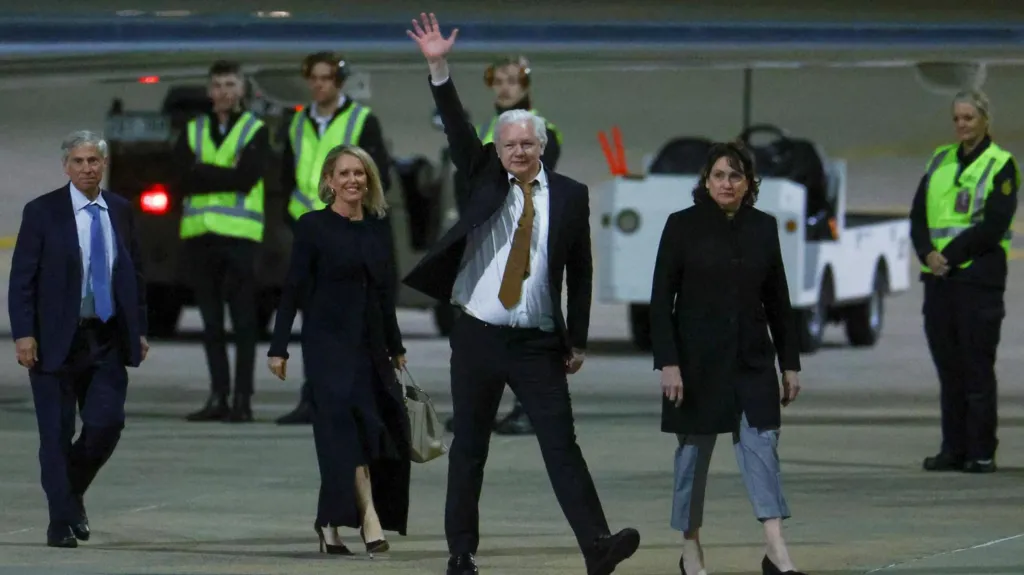Julian Assange has landed back home in his native Australia, after a plea deal allowed him to walk free from a London prison.
There were emotional scenes at Canberra Airport, as the Wikileaks founder kissed his wife and hugged his father, his lawyers watching on, visibly moved.
“Julian needs time to recover, to get used to freedom,” Stella Assange said at a news conference shortly after her husband arrived.
For the past 14 years, Assange has been in a legal battle with US officials who accused him of leaking classified documents, which they say put lives in danger.
The 52-year-old did not attend the news conference in Canberra, instead letting his lawyer and wife speak for him.
“You have to understand what he’s been through,” Mrs Assange said, adding that they need time to “let our family be a family”.
The couple married in London’s Belmarsh prison in 2022, and have two children together.
The plea deal saw Julian Assange plead guilty to one charge of conspiracy to obtain and disclose national defence information, rather than the 18 he was originally facing.
The case centred around a massive Wikileaks disclosure in 2010 when the website released a video from a US military helicopter which showed civilians being killed in the Iraqi capital Baghdad.
It also published thousands of confidential documents suggesting that the US military had killed hundreds of civilians in unreported incidents during the war in Afghanistan.
The revelations became a huge story, prompting reaction from all corners of the globe, and led to intense scrutiny of American involvement in foreign conflicts.
Assange formally entered the charge on the remote Northern Mariana Islands, an American territory in the Pacific, two days after leaving Belmarsh prison.
In return, he was sentenced to time already served and released to fly home.
His lawyer, Jen Robinson, told media that the deal was “criminalisation of journalism” and set a “dangerous precedent”.
Echoing this, Mrs Assange said she hopes the media “realise the danger of this US case against Julian, that criminalises, that has secured his conviction for newsgathering and publishing information that was true, that the public deserved to know”.
His lawyer also gave details on a phone call between Assange and Australian Prime Minister Anthony Albanese, who has been instrumental in securing his release.
Assange told the prime minister that he “saved his life”, Ms Robinson said, adding: “I don’t think that’s an exaggeration”.
“This is a huge win that Australia stood up to an ally and demanded the return of an Australian citizen,” she said.
Mr Albanese held his own news conference on Wednesday, saying he is “very pleased” that the case is over, adding that the Wikileaks founder has been through a “considerable ordeal”.
The PM has said in the past that he does not agree with everything Assange has done, but “enough was enough” and it was time for him to be released, making the case a priority.
When asked whether the plea deal may affect US-Australia relations, he said: “We have a very positive relationship with the United States. I regard President Biden as a friend, I regard their relationship as being absolutely central.”
The White House had nothing to do with Assange’s extradition, National Security Council spokesman John Kirby said.
Assange spent the last five years behind bars at London’s high-security Belmarsh Prison, fighting US attempts to extradite him to face charges over the document leaks.
In 2010, he faced separate charges of rape and sexual assault in Sweden, which he denied. He spent seven years hiding in Ecuador’s London embassy, claiming the Swedish case would lead him to be sent to the US.
Swedish authorities dropped that case in 2019 and said that too much time had passed since the original complaint.
Women’s rights groups in Sweden say it is a shame he never faced official questioning over the rape allegations.
“It’s a chapter of shame and betrayal that ends with his release,” Clara Berglund, head of the Swedish Women’s Lobby, told Reuters news agency.
“This is about a case that takes place on the major political stages, and men’s violence against women is given incredibly little weight.”




































